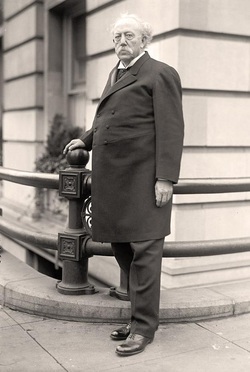Scientific Basis of Eugenics

David Starr Jordan often began his eugenics arguments with a discussion of biology first. He would remind readers that every species of plant and animal has individuals that stand out more prominently than the others. This is especially true of humankind and applied to both physical and mental qualities. Physically, not unlike the the characteristics looked for in horse breeding, humans should be "large in bone, large in strength, large in endurance" but also "large in moral character, large in intelligence, and large in personality." (#1 p. 67.) Consequently, Jordan believed war was dysgenic since it ended in the destruction of these particularly good strains of individuals. He conducted a survey in 1913 regarding the devastation of the civil war in the United States and labels it "a eugenic survey" in his memoirs (#3 p. 423)
Jordan was also explicit in his separation between Darwin and Social Darwinism:
"natural selection means the survival of those individuals fitted to their surroundings and the persistence through heredity of their traits. The dogma of "Social Darwinism" which would apply this principle to international or inter-racial rivalries has no foundation in the theories or discoveries of Darwin. The "struggle for existence," properly understood, is primarily the tendency or effort towards self-maintenance amid more or less adverse conditions of life; and mutual aid is a factor as necessary as any of the varied forms of competition. (#3 p. 417)
As a result, Jordan did not support many of the Social Darwinism movements during the era, such as sterilization and anti-immigration.
Jordan was also explicit in his separation between Darwin and Social Darwinism:
"natural selection means the survival of those individuals fitted to their surroundings and the persistence through heredity of their traits. The dogma of "Social Darwinism" which would apply this principle to international or inter-racial rivalries has no foundation in the theories or discoveries of Darwin. The "struggle for existence," properly understood, is primarily the tendency or effort towards self-maintenance amid more or less adverse conditions of life; and mutual aid is a factor as necessary as any of the varied forms of competition. (#3 p. 417)
As a result, Jordan did not support many of the Social Darwinism movements during the era, such as sterilization and anti-immigration.
Beliefs Regarding Race
Like many prominent intellectuals and leaders during the the turn of the 20th century, David Starr Jordan believed in the ideas of race supremacy and characterized himself as a Nordicist. While he didn't believe that the Nordic race was perfect in all forms, he did prefer the kind of citizens that upheld the virtues maintained by his puritan ancestors. As a promoter of freedom, Jordan believed that all men were born free and equal in a political sense, but that biological inequality not only prevailed between races but within races as well. As a distinguishing factor from other Nordicists, Jordan recognized the cultural and intellectual contributions of other races as superior to the Germanic peoples in many different realms. For example, he credited leadership in the arts to the Greeks and Italians. Additionally, he was fascinated by the people and cities of Japan which he visited extensively in conjunction with the World Peace Foundation. At a time before anti-Japanese fervor swept across the United States, Jordan remained true to his conviction when he writes in 1912: "In their thoughts and ambitions, in their attitudes towards peace and justice and toward modern civilization, the Japanese are in full harmony with the nations of Europe. It is their mission to bring the fruits of civilization to the rest of Asia" (#1 p. 64.) Jordan regarded the Japanese as a "branch of the Aryan race, belonging to the group vaguely known as Turanian and remotely allied to the tribes of the Caucasus" (#2 p. 402.) These important distinctions separated Jordan from the more radical Aryan Supremacists.
Also a tribute to his extensive background in biology, Jordan did not agree with contemporaries such as Madison Grant and Charles Gould in their belief that disastrous consequences would occur when races mixed. He regarded racial blending as inseparable from the progress of civilization. He used the United States as his prime example that the crossing of breeds would not harm the progression of a nation.
Also a tribute to his extensive background in biology, Jordan did not agree with contemporaries such as Madison Grant and Charles Gould in their belief that disastrous consequences would occur when races mixed. He regarded racial blending as inseparable from the progress of civilization. He used the United States as his prime example that the crossing of breeds would not harm the progression of a nation.
